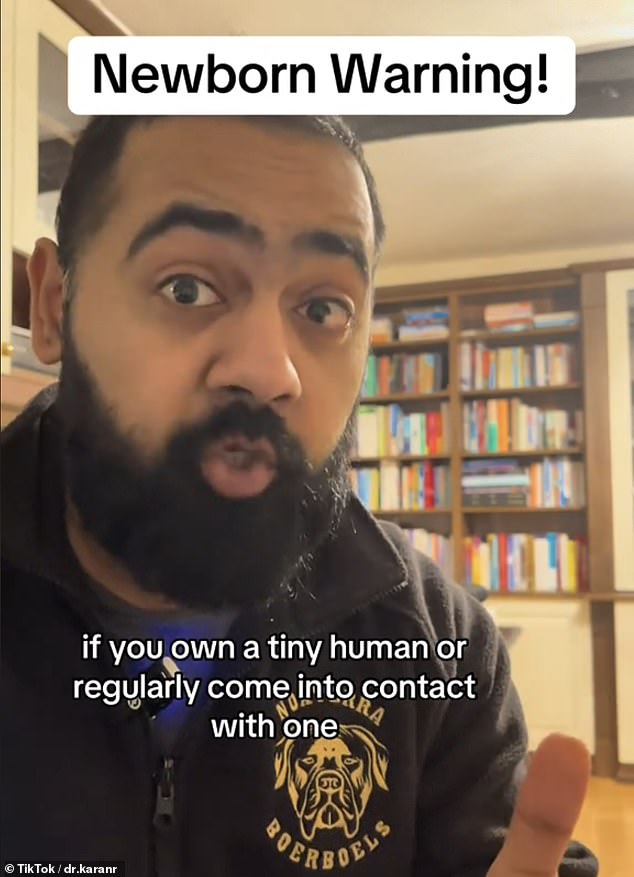When faced with the angelic smile of a friend’s newborn baby, it’s tempting to shower his or her adorable face with kisses.
But don’t — as doctors say kissing a young infant that isn’t yours could be fatal to the child.
Dr Karan Raj has warned his 5.3 million TikTok followers that our faces and mouths are teeming with millions of microscopic bacteria and viruses that can easily pass to a newborn.
While adults and older children have fullly developed immune systems which means bugs lead to little more than a cold, the same is not true for young babies under three months old.
An infant’s immune system is still ‘training’ to ward off foreign intruders and while it may have built up some defence to bacteria and viruses on their parents’ faces, they won’t be equipped to fight ones they’re newly exposed to.
It means a bacteria or a virus spread from a visitor could cross the blood brain barrier, leading to life-threatening complications.
The NHS surgeon issued the warning in response to a video that sees a woman put clingfilm on her face because she is desperate to kiss her newborn niece.
But Dr Raj said it’s far safer to avoid kisses altogether, in his clip that’s amassed 3.2 million views.

Dr Karan Raj warned his 5.3 million followers on TikTok that even illnesses that are not harmful to older children and adults could be deadly in newborns

The NHS surgeon revealed the terrifying reason in response to a video showing a ‘fun hack’ that sees a woman put clingfilm on her face because she is ‘desperate to kiss her newborn niece’
‘These tiny gremlins have an immune system that’s undergoing a software update,’ Dr Raj said. ‘It’s very immature and they’re more suseptible to infections.
‘This means even infections that cause mild symptoms in older children and adults, like the common cold, could be life threatening for newborns.’
Dr Raj even goes as far as to suggest extended family and friends wait two to three months until the baby’s immune system is stronger to plan their visits.
It is thought that the benefits of the occasional kiss from a parent may outweigh the risk, providing the parent is free from any infections such as the sniffles or a cold sore.
This is because physical bonding with parents is vital for the baby’s development, and the risk of them carrying pathogens the baby is yet to be exposed to is lower.
Experts have previously warned that some viral infections, which can be passed on through kissing, can cause young children to develop potentially serious complications like pneumonia.
Dr Muriel Meso, consultant paediatrician and endocrinologist at The Portland Hospital, part of HCA Healthcare UK in London told MailOnline that while adults can simply power through the sniffle, cough or a temperature babies can be hit much harder.
She gave the example of a cold sore, caused by the herpes simplex virus, which often ‘spontaneously resolves’ in adults, without the help of over-the-counter anti-viral creams.
But in newborns the virus can spread to the brain, causing seizures and damage to the spinal cord.
The same is true for chickenpox: dehydration, inflammation of the brain and other organs including the kidneys are all possible complications of chickenpox in newborns.
‘If it is left untreated they may go on to develop complications like pneumonia and other serious secondary infections,’ said Dr Meso.
This article was originally published by a www.dailymail.co.uk . Read the Original article here. .


